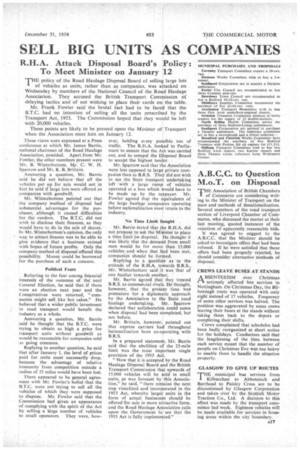SELL BIG UNITS AS COMPANIES
Page 19

If you've noticed an error in this article please click here to report it so we can fix it.
R.H.A. Attack Disposal Board's Policy : To Meet Minister on January 12
THE policy of the Road Haulage Disposal Board of selling large lots I of vehicles as units, rather than as companies, was attacked on Wednesday by members of the National Council of the Road Haulage Association. They accused the British Transport Commission of delaying tactics and of not wishing to place their cards on the table. Mr. Frank Fowler said the brutal fact had to be faced that the B.T.C. had no intention of selling all the units prescribed by the Transport Act, 1953. The Commission hoped that they would be left with 20,000 vehicles.
These points are likely to be pressed upon the Minister of Transport when the Association meet him on January 12.
These views were expressed at a Press conference at which Mr. James Barrie, national chairman of the Road Haulage Association, presided. Apart from Mr. Fowler, the other members present were Mr. B. Winterbottom, My. C. W. H. Sparrow and Mr. R. B. Brittain.
Answering a question, Mr. Barrie said he did not believe that all the vehicles put up for sale would not in fact be sold if large lots were offered as companies with goodwill.
Mr. Winterbottom pointed out that the company method of disposal had substantial advantages for the purchaser, although it caused difficulties for the vendors. The B.T.C. did not wish to disclose their finances, as they would have to do in the sale of shares. In Mr. Winterbottom's opinion, the only way to attract finance was to be able to give evidence that a business existed with hopes of future profits. Only the company method of disposal offered this possibility. Money could be borrowed for the purchase of such a concern, Political Fears Referring to the fear among financial interests of the outcome of the next General Election, he said that if there were an election next year and the Conservatives were returned, "companies might sell like hot cakes." He believed that a wider public investment in road transport would benefit the industry as a whole.
Answering a question, Mr. Barrie said he thought that the B.T.C. were trying to obtain as high a price for transport units without goodwill as would be reasonable for companies sold as going concerns.
Replying to another question, he said that after January 1, the level of prices paid for units must necessarily drop, because the advantage of relative immunity from competition outside a radius of 25 miles would have been lost.
There appeared to be general agreement with Mr. Fowler's belief 'that the B.T.C. were not trying to sell all the vehicles of which they were supposed to dispose. Mr. Fowler said that the Commission had given an appearance of complying with the spirit of the Act by selling a large number of vehicles to small operators. They were, how
ever, holding eery possible ton of traffic. The R.H.A. looked to Parliament to ensure that the Act was carried out, and to compel the Disposal Board to accept the highest tender. "
Mr. Sparrow said that the Association were less opposed to large private companies than to B.R.S. They did not wish to see the State transport undertaking left with a large rump of vehicles operated at a loss which would have to be made up by the taxpayer. Mr. Fowler agreed that the equivalents of the large haulage cotnpanies operating before nationalization must return to the industry.
No Time Limit Sought Mr. Barrie stated that the R.H.A. did not propose to ask the Minister to place a time limit on disposal. He thought it was likely that the demand from small men would be for more than 15.000 vehicles and when that had been met, companies should be formed.
Replying to a question as to the attitude of the R.H.A. towards B.R.S. Mr. Winterbottom said it was that of one haulier towards another.
Mr. Barrie agreed that they treated B.R.S. as commercial rivals. He thought, however, that the present time wag premature for a diplomatic approach by the Association to the State road haulage undertaking. Mr. Sparrow declared that collaboration could come when disposal had been completed, but not before.
Mr. Brittain, however, pointed out that express carriers had throughout -nationalization been co-operating with B.R.S.
In a prepared statement, Mr. Barrie said that the abolition of the 25-mile limit was the most important single provision of the 1953 Act.
Now that it is accepted by the Road Haulage Disposal Board and the British Transport Commission that upwards of 15,000 vehicles will be sold in small units, as was forecast by this Association," he said, "there remains the next step visualized and incorporated in the 1953 Act, whereby larger units in the form of actual businesses should be offerecrfor sale in more attractive form, and the Road Haulage Association calls upon the Government to see that the 1953 Act is fully implemented."












































































